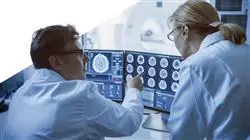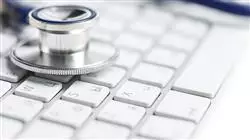University certificate
The world's largest faculty of information technology”
Introduction to the Program
Would you like to specialize in the field of IT applied to E-Health and Big Data? Enroll in this Master's Degree and embark on the path to a successful working future"

Access to more personalized healthcare, tailored to the needs of society and healthcare professionals, is becoming an ever closer reality thanks to the development of E-Health and the application of Big Data in the storage and analysis of information obtained in hospitals, doctors' offices and clinics. This is due, to a greater extent, to the significant leap made by the Internet and digital technologies, favoring connectivity and globalization through increasingly complex, specific and specialized systems.
Today it is possible to monitor patients' vital signs remotely, as well as to treat certain pathologies through virtual reality, all thanks to the work of thousands of computer scientists and engineers who have used their time and talent to create strategies and techniques that have undoubtedly considerably improved healthcare management. For this reason, and in view of the great expectations for the future in this field, TECH Global University has considered it necessary to develop a program through which professionals can learn about this field in detail.
In this way the Master's Degree in E-Health and Big Data arises, focused on the IT sector, a complete and comprehensive degree that will allow professionals to specialize in this field in just twelve months through 1,500 hours of the best theoretical and practical training. This is an academic experience with which they will be able to delve into aspects such as bioinformatics computing, the requirements to develop tools for molecular medicine and pathology diagnosis, the creation of biomedical databases or massive information processing.
All this in a 100% online way, from wherever they want and without predefined schedules. This program also includes diverse supplementary material with which students will be able to deepen in a personalized way in the aspects of the syllabus that they consider most important for their work performance. The extensive knowledge of the needs and demands of the health sector will allow them to develop tools and software adapted to the demand, so that the program of this Master's Degree will become the vehicle that will lead them to professional success.
Knowing in detail the needs of molecular medicine and pathology diagnostics will allow you to work on the development of specialized strategies and software for E-Health"
This Master's Degree in E-Health and Big Data contains the most complete and up-to-date program on the market. The most important features include:
- The development of case studies presented by experts in information and communication technologies focused on the healthcare environment
- The graphic, schematic, and practical contents with which they are created, provide scientific and practical information on the disciplines that are essential for professional practice
- Practical exercises where the self-assessment process can be carried out to improve learning
- Its special emphasis on innovative methodologies
- Theoretical lessons, questions to the expert, debate forums on controversial topics, and individual reflection assignments
- Content that is accessible from any fixed or portable device with an Internet connection
The healthcare sector is increasingly demanding and requiring a qualitative and quantitative leap in E-Health strategies. That is why this program will open many doors for you in the labor market"
The program’s teaching staff includes professionals from the sector who contribute their work experience to this educational program, as well as renowned specialists from leading societies and prestigious universities.
Its multimedia content, developed with the latest educational technology, will allow professionals to learn in a contextual and situated learning environment, i.e., a simulated environment that will provide immersive education programmed to prepare in real situations.
The design of this program focuses on Problem-Based Learning, by means of which professionals must try to solve the different professional practice situations that are presented to them throughout the academic year. For this purpose students will be assisted by an innovative interactive video system developed by renowned experts.
You will be able to delve into the latest aspects of bioinformatics computing through an extensive knowledge of the best search engines and networks"

Do you want to become a reference in the creation and management of biomedical databases? Opt for this Master's Degree and start working on it"
Why study at TECH?
TECH is the world’s largest online university. With an impressive catalog of more than 14,000 university programs available in 11 languages, it is positioned as a leader in employability, with a 99% job placement rate. In addition, it relies on an enormous faculty of more than 6,000 professors of the highest international renown.

Study at the world's largest online university and guarantee your professional success. The future starts at TECH”
The world’s best online university according to FORBES
The prestigious Forbes magazine, specialized in business and finance, has highlighted TECH as “the world's best online university” This is what they have recently stated in an article in their digital edition in which they echo the success story of this institution, “thanks to the academic offer it provides, the selection of its teaching staff, and an innovative learning method aimed at educating the professionals of the future”
A revolutionary study method, a cutting-edge faculty and a practical focus: the key to TECH's success.
The most complete study plans on the university scene
TECH offers the most complete study plans on the university scene, with syllabuses that cover fundamental concepts and, at the same time, the main scientific advances in their specific scientific areas. In addition, these programs are continuously being updated to guarantee students the academic vanguard and the most in-demand professional skills. In this way, the university's qualifications provide its graduates with a significant advantage to propel their careers to success.
TECH offers the most comprehensive and intensive study plans on the current university scene.
A world-class teaching staff
TECH's teaching staff is made up of more than 6,000 professors with the highest international recognition. Professors, researchers and top executives of multinational companies, including Isaiah Covington, performance coach of the Boston Celtics; Magda Romanska, principal investigator at Harvard MetaLAB; Ignacio Wistumba, chairman of the department of translational molecular pathology at MD Anderson Cancer Center; and D.W. Pine, creative director of TIME magazine, among others.
Internationally renowned experts, specialized in different branches of Health, Technology, Communication and Business, form part of the TECH faculty.
A unique learning method
TECH is the first university to use Relearning in all its programs. It is the best online learning methodology, accredited with international teaching quality certifications, provided by prestigious educational agencies. In addition, this disruptive educational model is complemented with the “Case Method”, thereby setting up a unique online teaching strategy. Innovative teaching resources are also implemented, including detailed videos, infographics and interactive summaries.
TECH combines Relearning and the Case Method in all its university programs to guarantee excellent theoretical and practical learning, studying whenever and wherever you want.
The world's largest online university
TECH is the world’s largest online university. We are the largest educational institution, with the best and widest online educational catalog, one hundred percent online and covering the vast majority of areas of knowledge. We offer a large selection of our own degrees and accredited online undergraduate and postgraduate degrees. In total, more than 14,000 university degrees, in eleven different languages, make us the largest educational largest in the world.
TECH has the world's most extensive catalog of academic and official programs, available in more than 11 languages.
Google Premier Partner
The American technology giant has awarded TECH the Google Google Premier Partner badge. This award, which is only available to 3% of the world's companies, highlights the efficient, flexible and tailored experience that this university provides to students. The recognition as a Google Premier Partner not only accredits the maximum rigor, performance and investment in TECH's digital infrastructures, but also places this university as one of the world's leading technology companies.
Google has positioned TECH in the top 3% of the world's most important technology companies by awarding it its Google Premier Partner badge.
The official online university of the NBA
TECH is the official online university of the NBA. Thanks to our agreement with the biggest league in basketball, we offer our students exclusive university programs, as well as a wide variety of educational resources focused on the business of the league and other areas of the sports industry. Each program is made up of a uniquely designed syllabus and features exceptional guest hosts: professionals with a distinguished sports background who will offer their expertise on the most relevant topics.
TECH has been selected by the NBA, the world's top basketball league, as its official online university.
The top-rated university by its students
Students have positioned TECH as the world's top-rated university on the main review websites, with a highest rating of 4.9 out of 5, obtained from more than 1,000 reviews. These results consolidate TECH as the benchmark university institution at an international level, reflecting the excellence and positive impact of its educational model.” reflecting the excellence and positive impact of its educational model.”
TECH is the world’s top-rated university by its students.
Leaders in employability
TECH has managed to become the leading university in employability. 99% of its students obtain jobs in the academic field they have studied, within one year of completing any of the university's programs. A similar number achieve immediate career enhancement. All this thanks to a study methodology that bases its effectiveness on the acquisition of practical skills, which are absolutely necessary for professional development.
99% of TECH graduates find a job within a year of completing their studies.
Master's Degree in E-Health and Big Data
Dive into the exciting world of technology applied to healthcare with the Master's Degree in E-Health and Big Data from TECH Global University. Discover how computing and data analysis are transforming the healthcare sector to continuously improve people's quality of life. Today, digitalization and the use of advanced technologies are revolutionizing the way healthcare services are delivered. With our Master's Degree, you will learn to develop innovative solutions that optimize medical processes and enhance patient care. The program is delivered through online classes, offering you the flexibility to study from anywhere and adapt your schedule to your needs. At TECH Global University, we are proud to provide a high-quality online educational experience. You will have access to expert professors in the field of health informatics, who will guide you throughout your learning. Additionally, you will have access to up-to-date educational resources and cutting-edge technological tools to enrich your educational experience.
Use technology for the advancement of health
The Master's Degree in E-Health and Big Data focuses on the application of information technologies and the analysis of large volumes of data in the healthcare field. You will learn to use tools and data processing techniques to extract relevant information that contributes to clinical decision-making and the improvement of healthcare services. You will also explore topics such as health system interoperability, medical information security, telemedicine, and artificial intelligence in healthcare. You will be prepared to face technological challenges and lead the digital transformation in the healthcare sector. If you are passionate about technology and want to contribute to the advancement of health using computer tools and data analysis, our Master's Degree is your path to professional success. Enroll at TECH Global University and become an expert in the convergence of informatics and healthcare!







